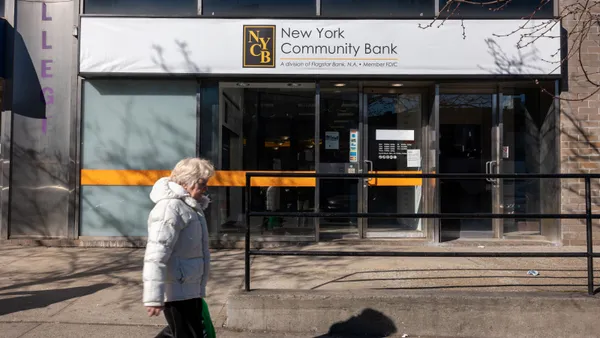Dive Brief:
- Citi on Tuesday reported net income of $3.2 billion — more than double the $1.3 billion it reported last quarter, but still a 34% drop from the $4.9 billion it posted a year ago.
- The difference maker may be a sharp decrease in the amount the bank added to its reserves: $314 million in the third quarter, compared with $5.6 billion in the second quarter and $4.9 billion in the first. Bad loan write-downs also leveled off — to $1.9 billion, about the same level as in 2019's third quarter.
- The bank included — perhaps earlier than expected — the $400 million penalty the Office of the Comptroller of the Currency (OCC) leveled against it last week over persistent issues in risk management, data governance and internal controls. The charge contributed to a 5% boost in Citi's operating expenses.
Dive Insight:
Revenue for the nation's third-largest bank was also buoyed by double-digit percentage-point increases year over year in fixed-income trading (18%), equities trading (15%) and deposits (16%). The fixed-income trading swell, however, leveled off considerably in comparison to the 68% jump the bank saw in the category last quarter.
The bank saw its share of double-digit declines, too. Revenue in the consumer banking unit, run by CEO-in-waiting Jane Fraser, fell 13%. Card revenue, meanwhile, dropped 18% for the world's leading credit card issuer, and spending volume fell 10%. This, too, represents a leveling off, when compared with decreases in card spending in the last week of March (30%) and during the second quarter (24%).
Total revenue at the bank fell 7% to $17.3 billion from $18.6 billion during last year's third quarter.
The bank's recent regulatory woes were top-of-mind enough for Citi CEO Mike Corbat to note in a statement Tuesday.
"We are committed to thoroughly addressing the issues contained in the consent orders," he said of the actions prescribed by the OCC and the Federal Reserve.
“This won’t be a quick or easy fix,” Corbat told analysts, according to Bloomberg. “In hindsight, we should have done this faster and prevented it from coming to this.”
The OCC, in addition to the $400 million penalty, reserved the right to require Citi to make changes to senior management and its board if the regulator deems the bank is moving too slowly. The bank announced last month that Corbat is stepping down in February. The OCC has also ordered the bank to seek its approval before making any "significant new acquisitions."
The Fed, meanwhile, gave Citi 120 days to submit a report detailing how it will hold senior management accountable and make executive compensation "consistent with risk management objectives."
The bank said it has spent about $1 billion this year to improve its risk management frameworks and controls, which may include an effort to upgrade its loan operation software, whose flaws were exposed in August, when the bank mistakenly paid creditors of beauty firm Revlon $900 million.
Meanwhile, Citi's chief financial officer, Mark Mason, said about 30% of the bank's New York City-area employees want to return to the office, according to a survey the lender circulated last month.
“There are no set plans at this point for the timing of the next phase," Mason told analysts Tuesday, according to Bloomberg. "We want employees to feel safe as they make their decision to return.”













